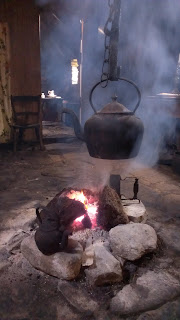Had a fairly light breakfast at the hostel – cereal and
toast. Packed up and set off by 10ish, although having learnt the lessons of
yesterday I stopped off at the hospital to pick up my walking boots and waterproof
trousers! First stop on the planned tour of the west coast was the “Clach an
Truiseil” – the tallest standing stone in Europe at over 6m. In a strange
position, with a house right next to it and surrounded by dry stone walls.
Great views down to the bay at Siorrabhaig, which we then walked down to. The
sea was incredible, churned up with big waves coming in from the Atlantic.
 |
| The tallest standing stone in Europe |
 |
| Incredible sea down at the coast, straight in off the Atlantic |
Back in the car we headed south to the Blackhouse museum at
Arnol. Looking at the village on an OS map it’s a blur of black lines, dividing
the land into small crofting areas. The museum described the traditional crofting
house next door, where a central fire kicked out loads of smoke that
waterproofs the roof, preserves the timbers and supposedly fights infections...
The warden described how the sphagnum moss that makes up some of the peat has
medicinal properties – this part was true, as it was used as a dressing in WWI for
this purpose. Not sure however about these properties remaining when it’s burnt
into smoke and then inhaled! The residents were meant to have lower rates of TB
due to its therapeutic cleansing effects. Down the road is the whalebone arch
at Bragar, the jaw bone of a blue whale that washed up on the beach nearby and
is now propped upright in somebody’s garden as a local landmark.
Next stop was the blackhouse village at Garenin – restored traditional
blackhouses with a small museum and excellent cafe. In one of the buildings a
film was playing showing the process of weaving traditional Harris tweed and
cutting peat, the only fuel out here. As there are no trees nowadays the only
local fuel source is peat. It burns with an incredible amount of smoke, and not
very much heat! Not sustainable at all, despite being traditional. In one of
the larger buildings they’d just opened a very well equipped hostel, would be a
great place to stay, can accommodate up to 16 people. The rest of the
blackhouses were self-catering accomodation. Nice bay at the bottom (Geodha
Ruadh), would be nice to swim in, weather permitting. Pretty isolated place!
Onwards to Carloway Broch, an incredible building which
functioned both as a house and a defensive structure from which to shelter from
marauding hoards. The thick double walls contain staircases used to gain the
upper floors, some of which were still preserved and were fun to explore. Sadly
a lot of the stone had been ‘recycled’ by the local community before the
structure became protected – the broch would have been much more impressive if
it was more complete. Understandable that they wanted to re-use the precious
stone resources, but perhaps lacked the foresight to realise that one day the
building would have the potential to bring money and jobs to the local
economies – easy to say now when not such a struggle for survival.
 |
| Carloway Broch |
The crown jewel of the west coast archaeology tour, also the
last stop, was Calanais stone circle – a set of very atmospheric standing
stones in an incredible position on the coast. Originally a stone circle, after
the arrival of Christianity the layout had been added to, converting the pagan
site into a symbolic cross with offshoots of more standing stones. We briefly
toured the mini visitor centre before calling it a day and heading back to
Stornoway.







No comments:
Post a Comment